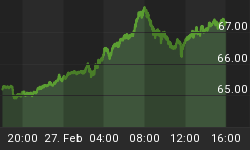Coming in at $3 billion less than some had feared, today's release of April's $57 billion trade deficit is being heralded as good news. The fact that the fourth worst monthly deficit ever is considered good news is startling evidence of just how far the bar has been lowered when it comes to America's deteriorating trade imbalance.
If America's monthly trade deficits continue at the "benign" level of 57 billion for the rest of the year, the annual 2005 deficit will top $685 billion, 11% higher than last year's record $617 deficit, and approximately 6% of GDP. On a per capita basis, that equates to about $2,300 per person, or $9,200 per family of four. That literally means that the typical American family will go $9,200 deeper into debt to the rest of the world, or almost 20% of average household annual pre-tax income. That is on top of the approximate $40,000 the typical family already owes the rest of the world. Were the trade deficit to continue at its present level for another 10 years, (an optimistic assumption given that it would require the deficit to stop growing), the typical family of four would owe approximately $150,000 to the rest of the world. If by that time interest rates were to rise to 8%, that would equate to monthly payments abroad of approximately $1,000 per household.
Though the dollar may have rallied against other fiat currencies is reactions today's "positive" data, it fell against gold. More importantly, priced in euros, gold broke through the 350 euro per ounce level for the first time ever, trading as high as 352 euros per ounce, up two percent for the week, and up 6% over the last three weeks. As I wrote in my commentary last week (available on my web site at www.europac.net) surging gold prices could force the ECB into a surprise rate hike, reversing the dollar's recent strength, and throwing the world's financial markets into turmoil.
On the opposite end of the trade spectrum, China's release yesterday of its May trade figures showed that its surplus had almost doubled from $4.58 billion last year to $8.99. This means that America's deficit with China is likely to deteriorate next month as well, from the already enormous $14.7 billion in April. Thus far in 2005, China has accumulated a $30 billion dollar trade surplus, in sharp contrast to last year's $9.2 deficit.
However, the most interesting aspect of China's trade statistics is that while China enjoys an enormous trade surplus with the United States, it enjoys a significant trade deficit with the rest of the world. If the real reasons for America's trade deficit with China were cheap Chinese labor and currency manipulation, as many contend, why then is it that only America is affected? After all, Chinese labor is cheap relative to labor in almost every other country for which it currently runs deficits, and if the yuan is under-valued against the dollar, it is even more undervalued against the currencies of many other nations.
Contrary to government and Wall Street propaganda, the real reasons for America's trade deficit is our non-competitive economy, which results mainly from excessive taxation and regulation and lack of domestic savings. Since nothing is being done to improve this situation, and since American consumers continue to convert house price appreciation into current consumption, expect America's trade balance to continue to deteriorate, until either the housing bubble bursts or the rest of the world comes to its senses and stops financing it.















